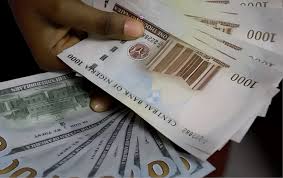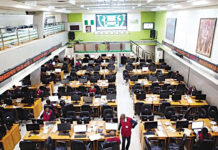The Nigerian naira showed signs of recovery on Monday, strengthening against the US dollar in the official market. This positive movement comes as the US dollar index edged lower, with investors eagerly awaiting upcoming US inflation data and a televised presidential debate.

At the Nigerian Autonomous Foreign Exchange Market (NAFEM), the naira traded at 1,580 to the dollar on Monday. This marks a 13 naira improvement from Friday’s closing rate of 1,593 naira per dollar.
The Central Bank of Nigeria (CBN) has taken action to support the naira by resuming dollar sales to local foreign exchange dealers. This move aims to counteract the recent decline in the naira’s value, which had pushed the exchange rate beyond the 1,600 naira per dollar mark. The increased demand for dollars, driven by various needs such as business transactions, travel expenses, foreign tuition payments, and imports, likely contributed to this pressure.
To regulate these transactions, the CBN has established guidelines for registered forex dealers. These include allowing a 1% markup on the purchase price and specifying locations for submitting applications.
Meanwhile, the US dollar is facing its own challenges. The dollar index, which measures the greenback’s strength against six major currencies, dipped slightly by 0.07% to around 101 points. This decline comes as investors prepare for two significant events:
1. The release of US Consumer Price Index (CPI) data on Wednesday
2. A televised US presidential debate on Tuesday
These events could have substantial impacts on currency markets and investor sentiment.
The Federal Reserve’s upcoming interest rate decision is another factor influencing the dollar’s performance. Market participants are debating whether the Fed will implement a standard 0.25% rate cut or a more aggressive 0.50% cut at its September meeting. Current predictions favor the smaller cut, with a 30% chance of the larger reduction.
Looking ahead, some financial experts predict a potential weakening of the dollar in the medium term. UBS, a major Swiss bank, has advised investors to sell any short-term gains in the US currency. They anticipate a possible correction in September, especially if the Federal Reserve remains cautious about larger interest rate cuts.
Traders are currently pricing in expectations of significant interest rate reductions throughout 2024, totaling about 1.10 percentage points across the remaining Fed meetings. This outlook is based on recent statements from Fed officials, including Governor Christopher Waller, who suggested openness to consecutive rate cuts or larger reductions if economic data supports such moves.
For Nigerians, the strengthening naira could potentially lead to more stable prices for imported goods and reduced pressure on foreign currency reserves. However, it’s important to note that currency markets can be volatile, and various global and domestic factors will continue to influence the naira’s value in the coming months.
As both Nigeria and the United States navigate their respective economic challenges, investors and everyday citizens alike will be watching closely to see how these currency movements impact their financial lives.



